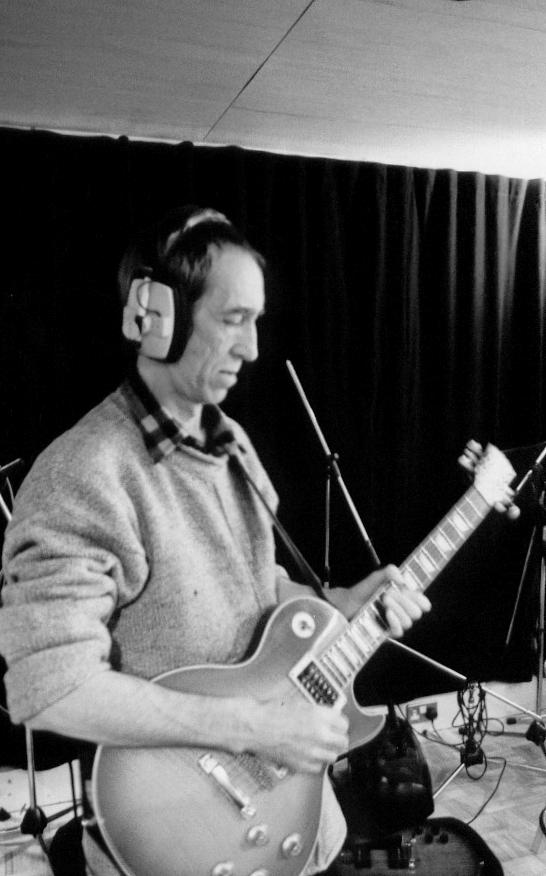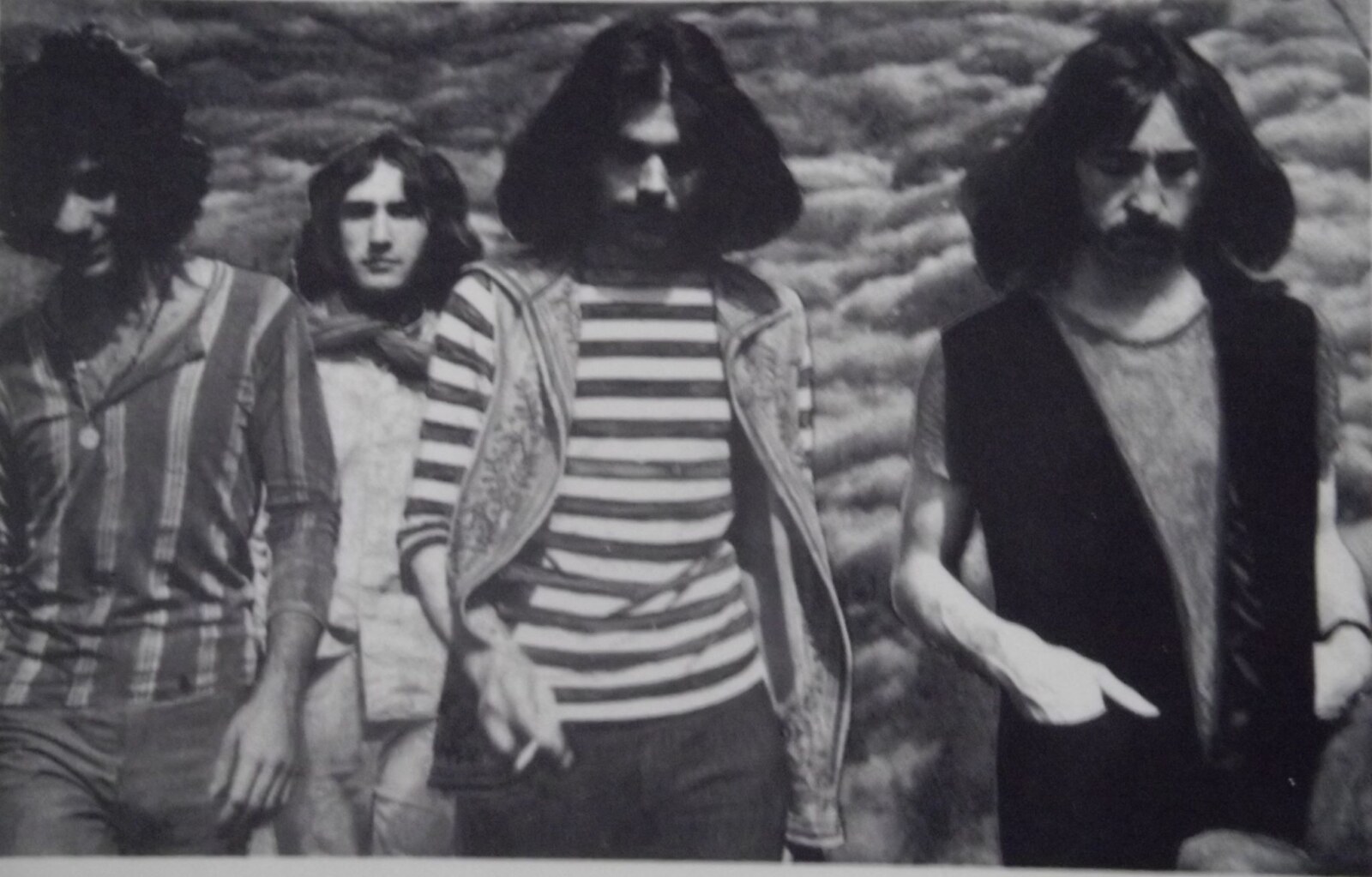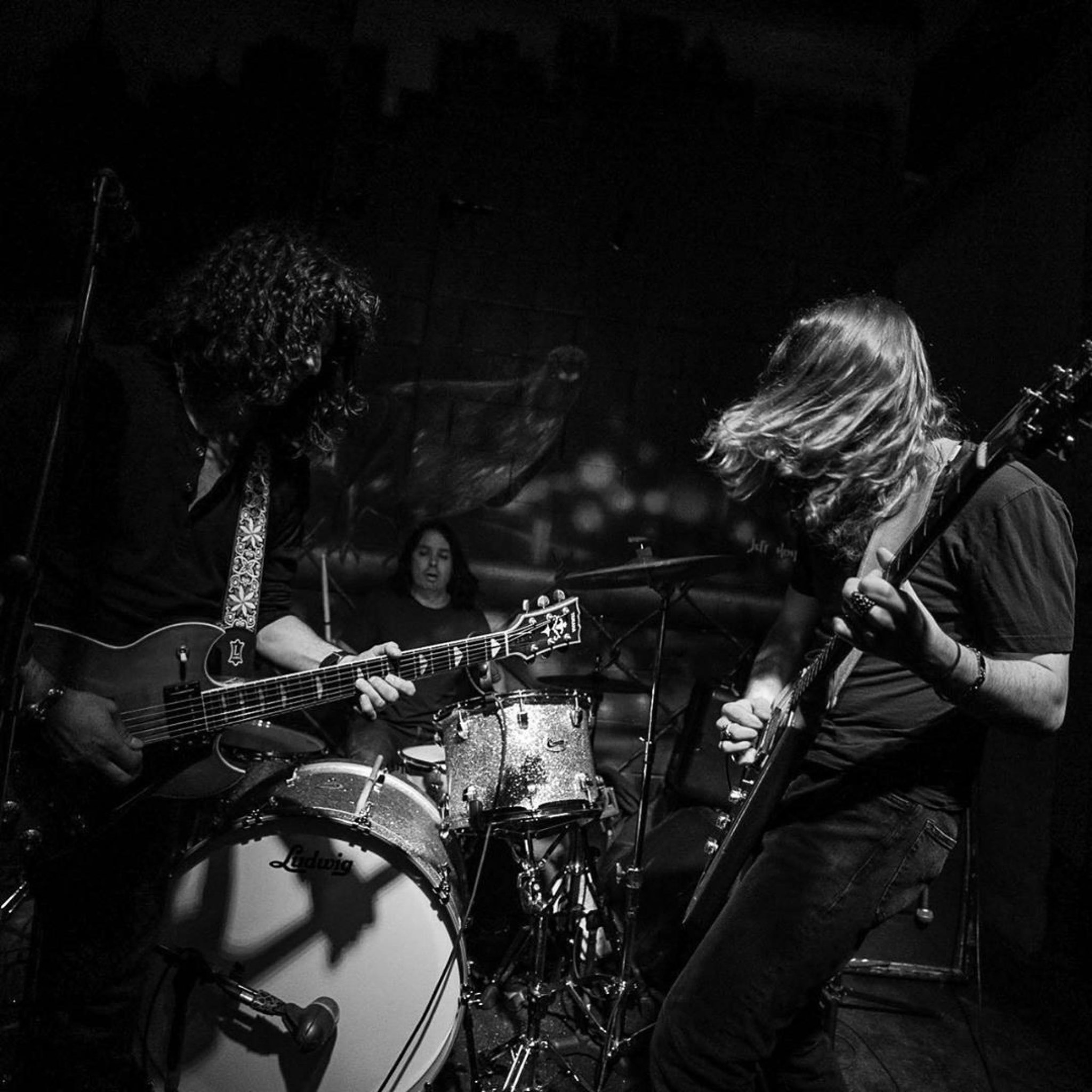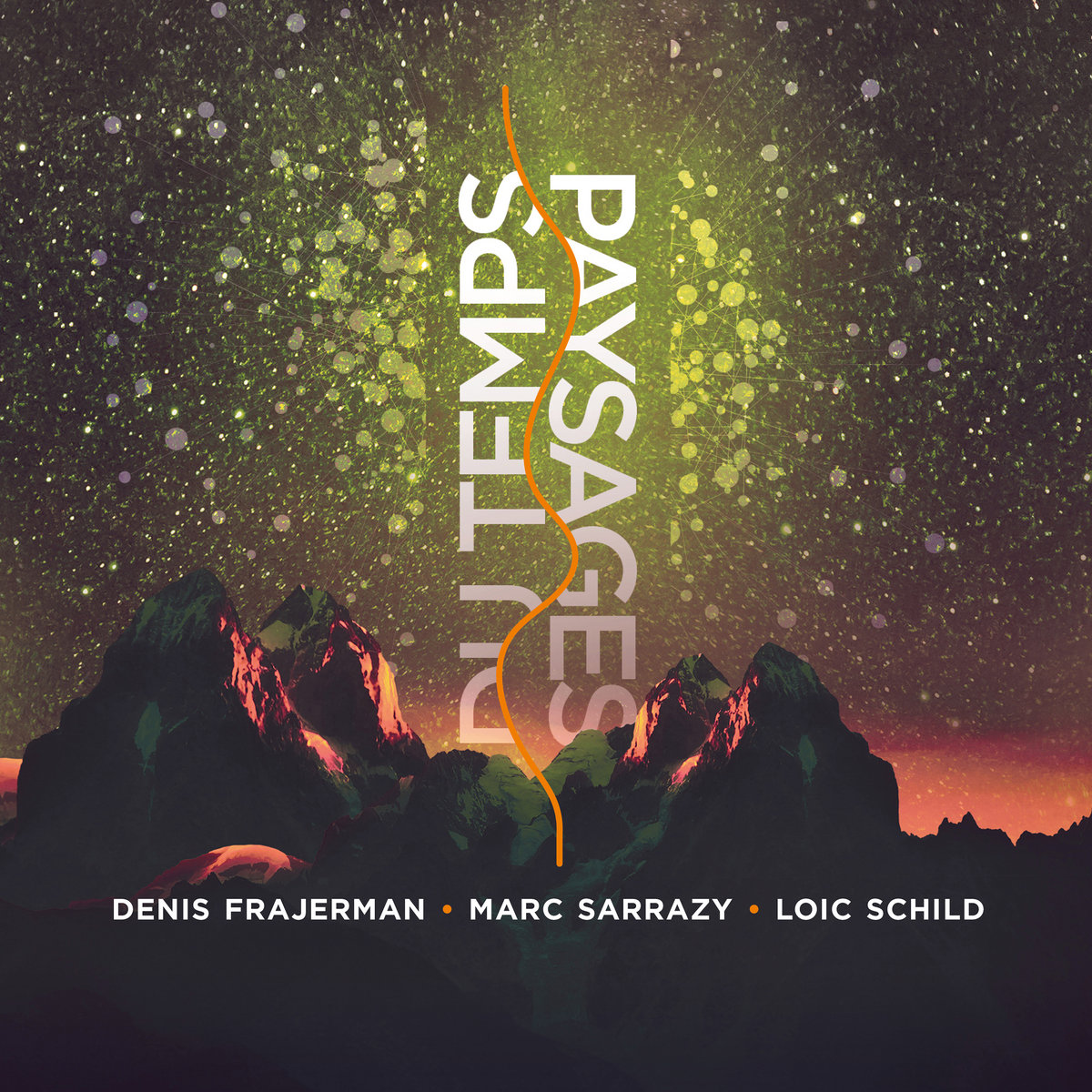In Memory of Tony Hill | High Tide
Tony Hill was one of my oldest friends. One of the downright nicest guys I’ve ever met. Down to earth, humble and unassuming and truly the most ground-breaking and unique guitarists I’ve ever heard.
The modes he employed in his playing were totally different from anything I’ve ever heard but always technically perfect and musical. He had a long and varied career but was best known for his work with The Misunderstood and his writing and performing with seminal Psychedelic band High Tide. I was fortunate enough to oversee and play on his solo album ‘Inexactness’ along with my friend and colleague Nick Saloman. He was a talented lyricist and a distinctive singer but it was his guitar work that caught the ear initially. A true one-off who will be missed so much by all who knew him. – Adrian Shaw

Perfect Sound Forever published a fantastic interview with Tony Hill conducted by his friend Adrian Shaw. I would like to thank Jason Gross at Perfect Sound Forever for allowing us to post the complete interview with Tony Hill.
Perfect Sound Forever: What was your first guitar and when?
Tony Hill: That would be a Fender Stratocaster for 158 guineas, which was a great deal of money in those days. (Note: a Guinea in the UK was an archaic 1 Pound and 1 Shilling!) But you did get a case and that was hard to come by in those days. You had to go to Newcastle for an American (model).
PSF: What made you take up guitar?
It’s got to start from the ’50’s rock and roll. Then, everybody went crazy for the Shadows, on the instrumental side of things. Everybody wanted to be Hank Marvin instead of Elvis. Then, everybody wanted to be the Beatles and then the Stones.
PSF: So how did you get into your first group?
I was working in the ship yards and a local band that I used to sit in with drove up in a van one day. They said ‘we’re going to France to do American air bases. We would really like you to play guitar.’ I thought ‘well, I’ll pack the job in and lose about six months off my apprenticeship certificate.’ Ah, you can blame them for all of this! (laughs)
PSF: Probably the best thing you ever did I would have thought. Did you have an amplifier at the time?
Yeah, you know the type. A Selmer box. An echoplex. Some sort of Watkins copycat. No P.A. to speak of in those days. No monitors, no fuzzboxes.
PSF: So you went off to France…
Yes, the American military bases. We were playing covers. That’s all the Americans wanted. We used to like R&B. After the country and western lot got pissed, we sort of turned the amps towards the admirals dancing with their girls and started some R&B and blues. I sort of came out of the cover bit and went crazy for blues. Took a blues band down to London then, called the Answers.
PSF: You recorded also.
Yes, the manager used to do a deal with the London record label to just put it out for you after you pay for the recording. Vincent had to take over drums and sing. It was just me and Ron on guitars, Bob on bass and Vince Edwards on drums and singing. He had a voice like Sam Cooke. That was the first experience of writing up something.
PSF: You were writing songs at that point?
Yeah. The precedent had been set by the Beatles and the Stones. They just covered for the sake of the audience. So it was an attempt and it usually works. You get the chords together and the rhythm in it. But nothing was generic.
PSF: When did the Answers finally break up?
When Vince wanted to go off on his own. People get temperamental. You don’t gig enough, you don’t make enough bread.
PSF: Tensions became evident.
Yeah but I’m amicable enough. Then those days, you hung around, didn’t you? (laughs) Then you buy a Danelectro or something. No, I bought a Gretsch. The Jet Firebird! The Beatles influence. Then that went for money. Then I got a Danelectro for next to nothing.
PSF: You have a history of selling guitars when times get tough?
Yeah, fifteen quid for a Vox. Then, for Denny Gerrard’s album, I did a bit of surgery on the guitar and got a nice record. This was with me, Simon, Pete and Rog.
PSF: The High Tide line-up, right?
Yeah but we’ve missed the Misunderstood! (laughs)
PSF: Right, we need to backtrack immediately. That’s very important.
Suffice to say, everybody knows what we’ve done and recorded. They went out of the country and couldn’t get back in again. So, that’s simple!
PSF: For people that don’t know, the Misunderstood were American.
From California.
PSF: And the line-up was…?
Steel guitar, Glen Ross Campbell. Rick Moe on drums. Steve Whiting on bass. Rick Brown singing and on harmonica.
PSF: So how did you get that gig?
I was down in a basement at a club with the Miscreants and the Pretty Things where we used to jam. Me and this bass player went down there. When we came out, there’s a guy up the steps rolling a spliff. ‘Hey man, you play guitar? You wanna gig?’ I said yeah. ‘Alright, come along.’ And that was it.
PSF: Just slotted in.
I heard this steel guitar and I thought ‘wow.’ Say no more.
PSF: You did some classic recordings with them.
Yeah, I got the opportunity to write a few things. John Peel played us before things went drastically wrong.
PSF: This was around ’67?
Yeah, it must have been. Then a year off back home, I think.
PSF: So the band split up then?
Yeah, they had to send for money and get a plane home. They couldn’t get back into the country from France. There was one manager and another having a bit of a contest there. Neither of them managed to suss that out.
PSF: Did they carry on without you in America?
I don’t think so because of the usual thing. They went their separate ways. Rick did come back but then ran off to India. Campbell had a stint in Juicy Lucy. Juicy Lucy 3 is still a good record.
PSF: He’s the only psychedelic steel guitarist I’ve ever heard.
Yes! He could have been good anywhere, not having much competition. He would have been regarded as good since he was a fine player. He’s a bit mad but I guess you got to be. (laughs) But that was a brilliant musical experience anyway. Yet again, not financially rewarding.
PSF: Well, when are they ever? Story of our collective lives.
Yes, I think it is.
PSF: So, there you are, up in London, the band can’t go back into the country to work. So you’re back looking for a gig again.
I go home, I come back. I got me band in London, that’s where it’s happening. There’s good bands in the North East but they’re usually cover bands. Good ol’ Mike Sutch helped me out then.
PSF: How did you know Mike Sutch?
Just hanging out. He used to get down to Cousins in the folk club bar. That’s a good place to hang out. We’d see Bert Jansch and Davey Graham and Al Stewart. Brilliant people. He said ‘Can you do this album for Denver (Gerrard)?’ He was on Decca. I think he did a production for the Small Faces too.
PSF: How did you get introduced to the other members of High Tide?
We went around Ian Samwell’s party. We promised to have Pete (Pavli, bassist) turn up. So there’s a slummy guy with curly black hair saying ‘hey man, wanna gig?’ In those days, you just had a try and you’d see what it was like. No business contract.
PSF: So, was Pete already in touch with Simon (House, violin) and Roger (Hadden, drummer)?
No. Roger came along later.
PSF: Oh, he worked for the record company (Liberty), didn’t he?
Yeah. We had somebody wanting to be our drummer, working at a publishers. Roger’s mates got in touch with Wayne (Bardell, manager) and said he’d like the job off his own back. We had to ask the drummer if he was willing to go totally full time and tour commitment instead of hoping to just gig around the West end. He said ‘let the other guy try.’ Roger’s a brilliant drummer. He fitted perfectly. So Simon and me took advantage of the top lines for that reason.
PSF: How did you meet up with Simon?
Hanging out with and crashing where we could at Mike’s or Wayne’s. Simon ended up crashing there as well. Simon was playing bass then. He said: ‘I used to play violin, you know?’ So I said ‘Get it!’ (laughs) That was basically it.
First we did Denver’s album (Sinister Morning) and then we rehearsed for the record company. Then we were into the studios at Bond’s Olympics where we met George Chiantz, brilliant producer/engineer with Family and Hendrix. We ripped and rehearsed and finally, the album got done to our satisfaction. Although these days I suppose the guitar would have been (really) ‘perfected.’
PSF: That was Sea Shanties, right?
Yes, that’s it. We didn’t expect it to be any sort of success, if only for the lyrics! (laughs)
PSF: At this point, I have to intervene because Tony is possibly the most modest musician I’ve ever met and his lyrics are absolutely superb. For those who aren’t familiar, the first High Tide album is considered as being one of the best-ever British psychedelic albums. I will bare absolutely no argument on that one.
Whew!
PSF: I recall the review in Melody Maker by a smart-ass.
Yeah, that was a “low ebb.” Very demoralizing. I read it and thought ‘what did they expect- for us to go on the pop charts?’
PSF: It was just some journalist wanker, saw the opportunity for a cheap joke.
Yes! And a couple of people in the record company too! ‘Rubbish.’
PSF: They really didn’t get it.
Yeah, no way.
PSF: It is unique. I’ve never heard anyone play guitar like you play. It’s complicated and very, very strange. And there’s this twin-lead onslaught of Simon House’s violin, who went on play with Hawkwind and Dave Bowie and Mike Oldfield. They used to do unison rounds, harmony rounds, all sorts of harmony arrangements. It is really the heaviest and most spine-chillingest stuff I’ve ever heard in my life.
And amazingly, Pete and Rog had no trouble at all.
PSF: Oh yeah, I think Pete is one of the best bass players I’ve ever heard in that style. Ex-soul man!
Yes, he had his own bass tuning.
PSF: Cello tuning I believe.
Yes! (laughs) Of course, he went to the ewe’s lot in the country. And as you know, he suffered poverty as well as we did. A martyr.
PSF: I should explain. We got to know the High Tide crowd. I was living in Madder Vale with my wife. And we got to know you guys who lived at Abbey Road, near the studio. We used to spend a lot of psychedelic times, as I recall, floating around. This was about ’69, I suppose.
It was a beautiful environment. It REALLY was.
PSF: Let’s backtrack because you mentioned Wayne Bardell and there was a company called Clearwater. It was Wayne with High Tide, Doug Smith with Hawkwind. A very interesting sort of freak’s collective, wasn’t it?
Yeah, it was community bands.
PSF: Free festivals and all sorts.
But with records.
PSF: Yeah, proper bands.
The good ol’ Roundhouse. We never managed to do Hyde Park. EVERYBODY did. I remember Blind Faith and Family. And what do you know? We go to Olympic Studios to do the second album and they tell me that Blind Faith’s bassist (Rich Gretch) is playing violin. Yeah, they had another all-night session in the other studio. He was just sitting there, saying ‘can we listen?’
PSF: Great times.
Yeah, absolutely. Priceless.
PSF: So then as I recall, we all moved down to Dorset with Arthur Brown to Puddletown. And you guys wanted to move to the country and you ended up in the next farmhouse from us, just up the lane.
That’s correct. It was great until it was part of everyone’s routine to walk six miles into Puddletown, Dorchester-style.
PSF: I do recall you turning over the group bus at one time.
I don’t know how I did that. I was determined to be injured and half-dead but it wasn’t having it. The van was dead. (laughs)
PSF: That was a bit of a blow.
It really was, with a wife and child to look after.
PSF: Lots of drugs as I recall. Huge amounts of LSD.
Yeah, but no alcohol. I had my experiences with that.
PSF: This was a very, very psychedelic environment, wasn’t it? I recalled that you guys were the quietest band I’d ever seen. We used to visit when we were in London and take our acid and decided to walk up the road and see you guys. There’d be the four of you sitting in the lotus position, not saying a thing, out of your minds on large quantities of LSD.
Yeah, coming around for dining and rehearsals. The thing is, you need your vitamins if you’re going to burn up like that. If I knew it was vitamins we needed, we wouldn’t have gone on to the downers and what have you. Your mental energy, that is it. If you can’t live, you can’t live. We still gigged and gigged.
PSF: Making very little money.
And the third album just didn’t happen.
PSF: But we better go on to the second album. After Sea Shanties, there was High Tide.
People usually think it’s the first album but we did it the other way around. You come off the drugs that inspire the imagination (LSD) to those which deaden the imagination (downers).
PSF: But make you feel more comfortable.
YES… and a little arrogant if I may say. The wrong sort of confidence. I sort of lost it. Rog lost it big time. I can’t explain…
PSF: He ended up in a hospital. He had a breakdown.
Apparently, he’d been a little subject to that before coming to London. He could have just stayed with his parents but they found it hard going. We’d keep hoping that he’d come out of it ’cause we were getting a bit better then.
PSF: He was very withdrawn at this period.
Yeah. He did have a little problem before, probably his chemistry. I didn’t know that. It could have made all the difference. Anyway, that was that.
PSF: Just to backtrack a bit, you’ve done two albums and you’re living in the country, finding things hard-going…
Extremely.
PSF: And at this point, Roger has a breakdown…
And there are a few hangers on.
PSF: And the band basically dissolves…
Yes because we just couldn’t put the third album together.
PSF: Which you’d rehearsed and written.
It might have even brought Roger out of it a bit, back on track.
PSF: Some of those songs have been subsequently released, haven’t they?
Um, yes. There’s SPN, Worldwide. There’s first Italian job that Simon and I had put together would be Interesting Times.
PSF: I remember that. But was somewhat later.
Yeah, that was when I was down and out! (laughs)
PSF: Interesting Times was in the ’70’s, right?
Late ’70’s. That said, a lot of bad things… Oh, you don’t want personal history of the domestic sort. So, I was pretty out of it and you helped me out. It was about the early ’90’s that Drachen got in touch with me.
PSF: Drachen Theaker, who was living in Puddletown. He was a member of Arthur Brown’s band and he had been a member of Love. He was a true eccentric.
He was an Indian percussionist.
PSF: Yes, that was his love and he’s sadly dead now. So he got you into his home studio and got you recording.
Yes, his wife was a traditional Indian singer was there as well. Well, yet again you were inspiring me to carry on. Because I didn’t have that much to do except the album, which wasn’t successful at all. (laughs) But I was playing on Drachen’s tracks, doing just the solos.
PSF: He was doing it in an interesting way as I recall. He would record and then cut it into bits.
Yes, at some point, he’d substitute a tabla for a (drum) kit he was using. Of course, he was off from a rock situation. Can’t recall much more than that! (laughs)
PSF: Of course, there was a solo album too. That was on SPN as well?
That surprised me as well. He had done the cover and there was this CD with tracks you wrote on. Luckily, some of the acoustic tracks were from the ’70’s when I still had some of it left. Couple of songs about my wife, juggling and growing old. It was sentimentally inspired. Nothing like High Tide. It would be nice if we could get paid! (laughs)
PSF: So that was in the ’90’s and Drachen, as we said, sadly passed away. From a brain tumor.
Yeah, he was fighting it, he was.
PSF: Unfortunately, he lost. And of course, Andy died as well.
Andy, yeah…
PSF: Roger is still missing in action. Simon House is… back with Hawkwind I believe.
Yeah, Simon tours! Maybe we’ll bring him out again.
PSF: So maybe you could tell us what you’re doing now?
I was saved from myself by Adrian and Nick (Saloman, fellow Bevis Frond member with Adrian)! Ha.
PSF: I would LOVE to take credit for that.
No, you were an inspiration for me. I really mean that sincerely.
PSF: That is brilliant. Thank you. Well, we got this thing, Black Widow, an Italian label, who are HUGE Tony Hill fans. They’re putting out a retrospective. It’s basically the best of High Tide apart from the two studio albums.
Yeah, there were other things we were rehearsing. There’s you, Andy and Drachen recording us at your house in the country.
PSF: But there’s also some High Tide tracks with the original four piece (group).
Yeah and a bit of that as well. The whole sound.
PSF: You’ve also done a track for that and so did Pete (Pavli, from High Tide).
Yes, they did come out well.
PSF: Black Widow are so excited about this, that they want to do another album with you and Pete. But not before… we get your next album, coming out soon!
As we speak. Apparently, one’s brain can recover. What you need to do boys and girls is to not make yourselves unhappy. It will save yourself a lot of money for psychoanalysis or whatever.
PSF: You had 30 years of day-over hell basically.
Yeah, you argue with yourself. You don’t look after yourself. You think ‘the world is a bit shitty’ but you do it to yourself. Because you’re in about your head, arguing with yourself. ‘They can’t see my point of view.’ But you’re not being explicit. You’re not being honest. And really, you don’t have the imagination you should have. If you’re irresponsible and you’re taught your imagination back, you’ll abuse it. Of course, your brain being an automaton, it’ll just learn culturally, personal culture, that these things have become habitual in spite of. So, you have to resurrect from a total chemical perspective.
PSF: Which you’ve managed to do.
Yeah, I don’t drink. I don’t take drugs, this morning!
PSF: A bit of smoke does not count!
The encouragement (that) you and Nick give me. Leon too (Tony’s bass-playing son).
PSF: Well, there we should mention Earth Below. Your son’s in an excellent band, a three piece where he plays bass.
Oh yes! This is not nepotism folks. This is true. It stands alone.
PSF: If I may say this, you, me and Nick have got three kids, all of whom without any bullshit, are enormously talented.
Yeah, they came through.
PSF: Which is incredible and a source of much satisfaction all around, I think.
Yeah and not blatantly, obviously commercial. Just good enough to sell world-wide.
PSF: Stands on its own merits. So things are on the up for you now?
Yes. We just worry about our health now, right?
PSF: Indeed. But you’ll have a Woronzow album coming out in the next few months. Then a Black Widow one and then hopefully some gigs.
Right. That’s what’s planned. At the moment, I’m just enjoying mixing with all the other bands.
PSF: I think it’s safe to say, it’s been a bit of a surprise to you that there’s been a big psychedelic audience out there.
ABSOLUTELY. Might have made no difference at the time but now it’s absolutely amazing.
PSF: Having watched you play on Sunday, I can honestly say that you’re playing as well as ever. It sounds superb.
Well, all I can do is to hope to maintain that standard. If I can do that, it’ll please me. I have no wish to do something like Jimmy Page with the Black Crowes.
PSF: You like him?
Oh yeah. The Zeppelin tracks. The guy’s guitar is still there as much as it was in 1969. It is really wicked.
PSF: He’s been through the mill as well.
Yes. Heavy strings on the Les Paul, no sweat! Production’s all there.
PSF: How do you describe the way you work now?
It’s not a ‘let’s wait and see what it sounds like.’ It’s just sense of humor and enthusiasm. The only thing that’s hurt me is physical. The rest is all sticks and stones, folks! (laughs) I’m telling you- don’t hurt yourself. You just try to put it to get together and I just thank again you and Nick for resurrecting me.
PSF: Well, thank you for coming back.
Well thank you for gathering me up from the streets. I just hope that the same can be said of what we’re doing now that can be said of the first two (High Tide) albums.
PSF: I suspect it will be. I think it’s going to be really well received.
Well, it won’t be for the want of trying! (laughs)
Headline photo: High Tide in Zig-Zag
All photo materials are copyrighted by their respective copyright owners, and are subject to use for INFORMATIONAL PURPOSES ONLY!
High Tide interview
Adrian Shaw talks about Magic Muscle, Hawkwind and The Bevis Frond …
Interview with “Space Rocker” Rustic Rod Goodway about Magic Muscle, …
The Misunderstood interview with Rick Brown
‘Hawkwind: Days Of The Underground: Radical Escapism in the Age Of Paranoia’ | Interview with Joe Banks





Really shocking. Had always hoped for a come-back. RIP